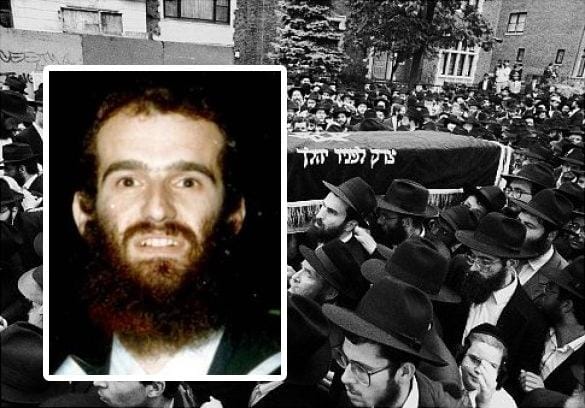Thirty years ago, the Crown Heights neighborhood in Brooklyn became the epicenter of a tragedy that exposed deep-seated racial tensions. Yankel Rosenbaum, a young Jewish scholar visiting from Australia, was brutally murdered during the unrest, forever etching his name into the complex narrative of racial strife in America.
A Life Cut Short: The Murder of Yankel Rosenbaum
The Crown Heights riots erupted in August 1991, following the tragic death of Gavin Cato, a seven-year-old Black child struck by a car in the Lubavitcher Rebbe’s motorcade. This incident ignited simmering racial tensions in the community, culminating in days of unrest and violence.
Yankel Rosenbaum, in New York for research, tragically found himself in the wrong place at the wrong time. Walking blocks away from the epicenter of the riots, a mob of angry youths attacked him, fatally stabbing the young scholar.
Rosenbaum’s murder sent shockwaves through the community and became a focal point of the tragedy. The Black community grappled with the anger and despair stemming from the systemic inequalities that led to the accident, while the Jewish community reeled from the brutal and seemingly random killing of one of their own.
A Fractured Community Seeks Justice
The aftermath of the riots was a tangled web of accusations, mistrust, and calls for justice. The police response was criticized as being heavily skewed against the Black community, and the subsequent trials of Rosenbaum’s alleged attackers did little to heal the divide. The acquittal of one of the accused, Lemrick Nelson, even with what many considered overwhelming evidence, deepened the wounds of injustice and fueled further resentment.
Driven by grief and a thirst for justice, Rosenbaum’s family relentlessly pursued legal action. Their efforts led to federal civil rights charges against several individuals for inciting the mob that attacked Yankel, ultimately securing some measure of accountability. However, these legal victories couldn’t erase the pain of their loss or fully mend the fractured relationship between the Black and Jewish communities in Crown Heights.
Lemrick Nelson: A Life Intertwined with Tragedy
Lemrick Nelson’s story is deeply intertwined with the Crown Heights riots. Nelson, a young Black man, was accused of being involved in Rosenbaum’s death. While he initially maintained his innocence, his case took a significant turn years later in 2003. During a federal trial focused on potential civil rights violations, Nelson confessed to stabbing Rosenbaum. This confession led to his conviction and a 10-year prison sentence.
Understanding Nelson’s life requires considering the context of his upbringing. He endured an incredibly difficult childhood, marked by poverty, instability, and exposure to violence. Born to immigrant parents from Trinidad and Tobago, Nelson faced significant challenges from a young age. His mother battled mental illness, and he spent time in a shelter for battered women as a toddler. The violence he witnessed between his parents likely left a deep impression. These early experiences with trauma and instability likely shaped his worldview and reactions to stressful situations.
Fast forward to 2013, Nelson was released from prison having served his sentence. Since then, information about his life has been scarce. It’s unclear where he currently resides or what he does. The lack of information about Nelson’s life after prison raises more questions than answers. Did he receive any support in reintegrating into society? Has he tried to make amends for his past actions? Does he carry remorse for the pain he caused? These unanswered questions highlight the ongoing challenges of rehabilitation and reconciliation, particularly within the context of such a racially and emotionally charged case.
The Crown Heights Riots: A Community Divided
The Crown Heights riots serve as a chilling example of how quickly simmering tensions can boil over into violence and chaos. The death of seven-year-old Gavin Cato, struck by a car in Rabbi Menachem Mendel Schneerson’s motorcade, became the catalyst for an outpouring of grief, anger, and frustration. Rumors and misinformation surrounding the accident, coupled with long-standing grievances over social and economic disparities, fueled outrage directed at the Hasidic Jewish community.
Adding fuel to the fire, many in the Black community perceived a lack of urgency in helping the critically injured Cato, further deepening feelings of resentment. This volatile situation escalated into three days of unrest, with attacks on Jewish homes and businesses, culminating in the tragic death of Yankel Rosenbaum.
The Crown Heights riots forced New York City to confront the deep-seated racial divisions within its boroughs and grapple with the urgent need for improved community relations. In the aftermath, the city implemented various changes aimed at addressing these issues, but the scars of those three days in August 1991 continue to serve as a reminder of the devastating consequences of unchecked prejudice.
Thirty Years Later: Reflections on a Tragedy
The legacy of Yankel Rosenbaum is a somber reminder of the fragility of social harmony and the devastating consequences of unchecked prejudice. It serves as a stark lesson about the importance of open dialogue, mutual understanding, and addressing the root causes of racial and social inequity.
Thirty years on, the echoes of the Crown Heights riots still resonate, prompting reflection and a continued push for reconciliation. Organizations like the Crown Heights Jewish-Black Dialogue Group are working tirelessly to bridge the chasm of distrust, fostering understanding and cooperation between communities. Their efforts, and those of countless individuals, are testaments to the enduring hope for a future where tragedies like Yankel Rosenbaum’s become a relic of the past.
Dive into the captivating history of how colonies ought to be encountaries, for a deeper understanding of the complex dynamics of colonialism.
Explore the nuances of Soviet reforms by contrasting glasnost and perestroika, uncovering their distinct roles in shaping Soviet society.
Discover the extraordinary life of Elizabeth Bacon Custer, a remarkable frontierswoman whose courage and resilience left an enduring legacy in the annals of the American West.
- Unlock Filipino Culture: A Deep Dive into Traditions and Practices - April 23, 2025
- Unlock Spanish Culture: Insights & Opportunities Now - April 23, 2025
- White Spirit Uses & Substitutes: A Deep Dive for Pros & DIYers - April 23, 2025
















